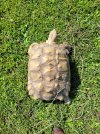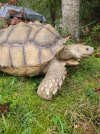I have had my sulcata for about 2 weeks now after adopting him from a woman who could no longer take care of him. She fed him an improper diet of dogfood and bananas for all 22 years of his life, so he has some deformation in his shell and is small for his age I believe.
I have tried fixing his diet slowly, to incorporate more grass, kale and hay, as well as almost no fruit except one apple every Sunday. Obviously I also wont be feeding him dog food either haha. He is a bit stubborn and won't eat any hay on its own though. That is my first problem, does anyone have any suggestions on how to get tortoises to eat more hay? I got him orchard grass hay in case that matters.
Next problem I have, I believe, comes from him not eating enough hay. He does not seem to be pooping regularly if at all. I have cleaned up a few white poops which I understand are his method of peeing? But I have not seen many regular hard brown poops. How long should I wait before calling a vet? I have been feeding him pumpkin to try and elicit healthy bowel movements but it doesn't seem to be working. I know soaking a Tortoise can help on this front, but he is so big I don't know if he will fit in my bathtub (also getting him upstairs seems impossible).
My last question is are there any guaranteed symptoms to watch out for respiratory illnesses in adult male sulcatas? His breathing never seems strained and he never has any mucous/discharge from his nostrils but I have noticed occasionally he does have irregular/shallow breaths.
Any help will be greatly appreciated, I want to give him the best life I possibly can since his first 22 years were less than ideal.
His name for anyone wondering is Sullieman The Magnificent!
I have tried fixing his diet slowly, to incorporate more grass, kale and hay, as well as almost no fruit except one apple every Sunday. Obviously I also wont be feeding him dog food either haha. He is a bit stubborn and won't eat any hay on its own though. That is my first problem, does anyone have any suggestions on how to get tortoises to eat more hay? I got him orchard grass hay in case that matters.
Next problem I have, I believe, comes from him not eating enough hay. He does not seem to be pooping regularly if at all. I have cleaned up a few white poops which I understand are his method of peeing? But I have not seen many regular hard brown poops. How long should I wait before calling a vet? I have been feeding him pumpkin to try and elicit healthy bowel movements but it doesn't seem to be working. I know soaking a Tortoise can help on this front, but he is so big I don't know if he will fit in my bathtub (also getting him upstairs seems impossible).
My last question is are there any guaranteed symptoms to watch out for respiratory illnesses in adult male sulcatas? His breathing never seems strained and he never has any mucous/discharge from his nostrils but I have noticed occasionally he does have irregular/shallow breaths.
Any help will be greatly appreciated, I want to give him the best life I possibly can since his first 22 years were less than ideal.
His name for anyone wondering is Sullieman The Magnificent!

